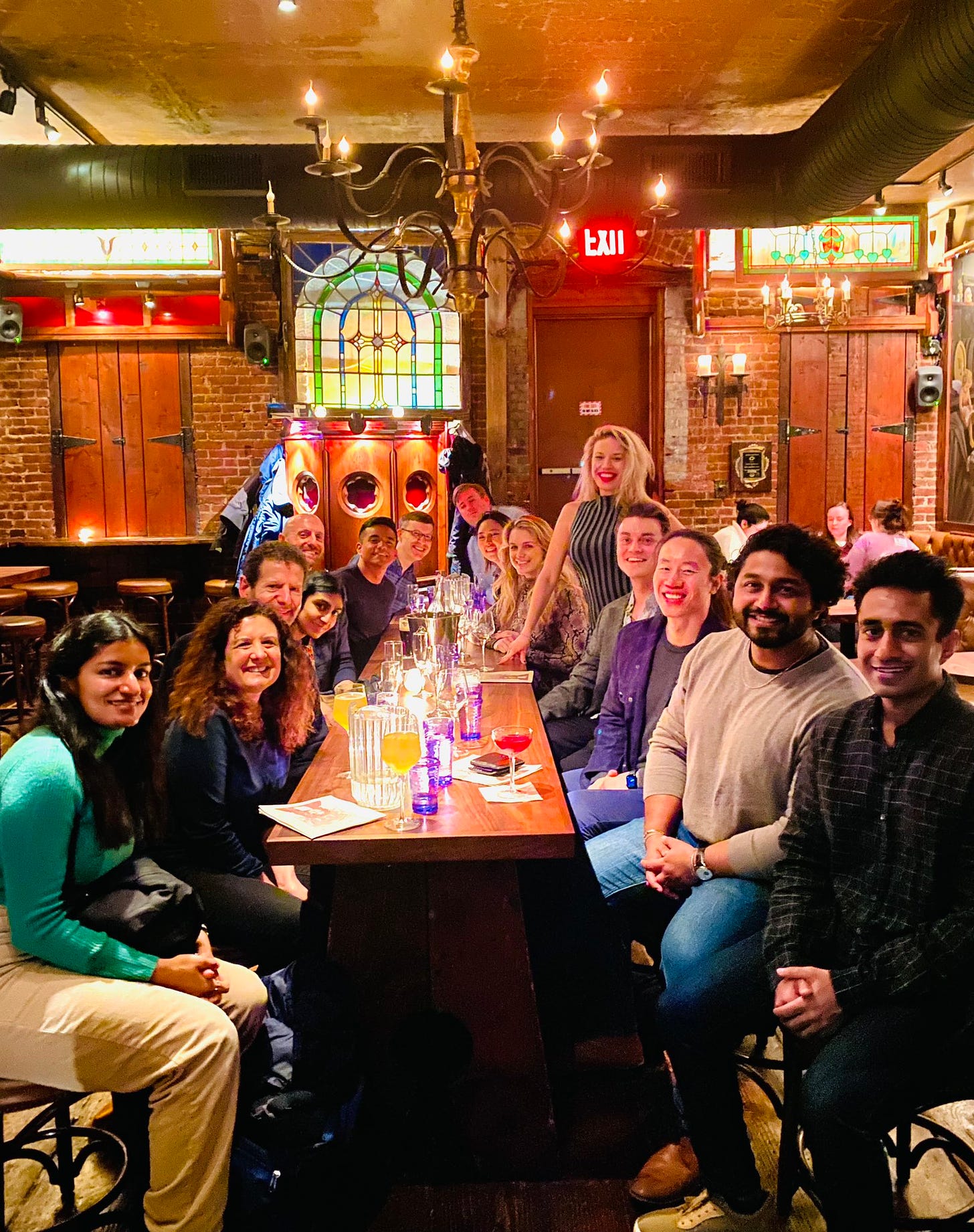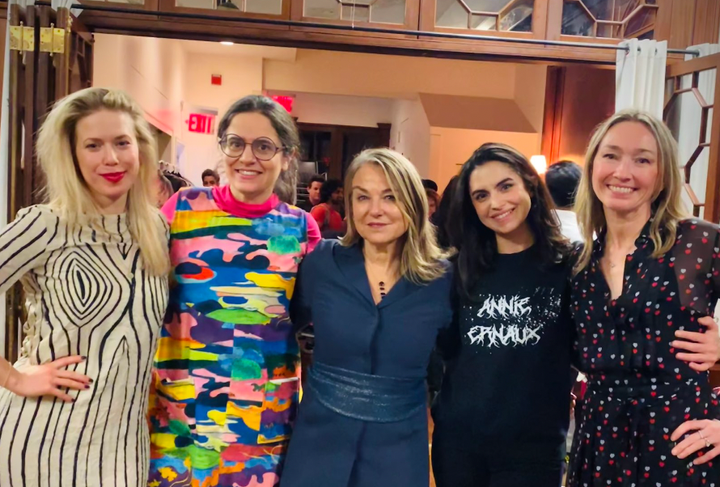Anna Gát: What to Read This Weekend #51

Critics, insects, self-promoters. Dates, eggs, moralities. Materialists, polyamorists, journalists, armies in the desert. And Pynchon, Taylor Swift, Girard... Penultimate week before the anniversary!
Subscribe to Anna’s weekly digest on the Interintellect Substack.
I feel I might never leave New York City: I love it here too much! I’ve just walked 2 hours in the cold around Manhattan, which is becoming my favourite sport. And Interintellect feels so much at home here…

I’ve read some amazing things this past week — please scroll down for my selection for you.
My weekend will be spent diving into Jon Haidt’s upcoming book The Anxious Generation (do consider preordering!), and Matthew Potts’ promising Forgiveness, a topic I think a lot about these days.

On Interintellect, some online conversations you might want to join: Devorah Baum’s marriage book will prompt an interesting discussion, I’ll be hosting a little salon on the medieval history of self-help, Wayfare Magazine continues our partnership together with a salon on loving one’s enemies, and Nir Eyal returns to talk about living distraction-free.
Let’s get to the readings. Love x Anna
We Need More Content!
But what’s wrong with calling for cultural production? People have always thought ideas matter! But classically, the way to push an idea into the mainstream is to do it yourself. Socrates argues in the agora, Paul preaches to the crowds, Marx and Engels write books. But the call I’m noticing is always for someone else to create media that will convince other third party observers. What gives?
- Santi Ruiz
Margaret Cavendish’s “Mad” Imagination
Across almost three hundred poems, Cavendish speculated about how atoms joined to form everything in the world, from a fire’s stinging spark to the broad boughs of an oak tree. Look around, her poems urged: at the air, the mist, the wind, and the water. Listen to each proclamation of mirth and melancholy, love and hate. What is it made of? How does it change? What are the smallest and largest scales at which consciousness exists? Her answers to these questions evolved in three scientific treatises…
- Merve Emre; The New Yorker
Who Needs Fiction After the Internet?
“The more we assign meaning to symbols … the more we desire the symbols themselves.”
- James Duesterberg; The Point
Inventing the Perfect College Applicant
For the past nine years, [Christopher Rim], 28, has been working as an “independent education consultant,” helping the one percent navigate the increasingly competitive college-admissions process — the current round of which ends in February. He started by editing college essays from his Yale dorm room for $50 an hour but now charges the parents of his company’s 190 clients — mostly private-school kids, many of them in New York — $120,000 a year to help them create a narrative he believes will appeal to college-admissions officers.
- Caitlin Moscatello; New York Magazine
Reason and romance: The world's most cerebral marriage
[Janet Radcliffe-Richards] says she was initially “utterly baffled” by [Derek Parfit]. He lacks certain common traits and doesn’t pick up on many normal social messages. He has no envy or malice (though he is no stranger to pride). During the “courting” process there were none of the usual wooing signals—no flowers or chocolates—but he did once thrust into her arms the complete keyboard scores of Bach.
- David Edmonds; Prospect
Chicken Littles Are Ruining America
Extreme pessimism is now the go-to conversational stance. This tweet from The Washington Post’s Taylor Lorenz captures the vibe: “People are like ‘why are kids so depressed? It must be their PHONES!’ But never mention that fact that we’re living in a late stage capitalist hellscape during an ongoing deadly pandemic [with] record wealth inequality, 0 social safety net/job security, as climate change cooks the world.”
- David Brooks; The Atlantic
Practicing my Handwriting in 1439
We are still in the very early days of AI development. Still, the current uses of nascent AI tech is evidence for what the future will bring. So far, AI has been complementary to knowledge work. It makes software developers twice as fast on some tasks and improves the quality and speed of consultants. In my personal experience it’s a very useful complement to my research and coding, allowing me to work and produce more. As AI matures, this may change. Scribes and illuminators were complements to printing in the early days of the press when illustrations and complicated formatting were more difficult, but it didn’t last.
- Maxwell Tabarrok
What If the Real War in Israel Hasn’t Even Started?
Since October 7, most eyes have been on Israel’s south, but as the prophecy from the Book of Jeremiah reads, “the evil will come from the north.”
- Matti Friedman; The Free Press
Why is it so hard to forgive?
A recent tweet by the Atlantic writer Elizabeth Bruenig got me thinking about this in a different way. “As a society,” she wrote, “we have absolutely no coherent story — none whatsoever — about how a person who’s done wrong can atone, make amends, and retain some continuity between their life before and after the mistake.” I think she’s right.
- Sean Illing; Vox
Freedom's Frustration
The Great Transformation is a classic - I am ashamed I had not read it earlier. Although it can appear dated at times, I was shocked by how eerily modern it seemed; a testament to the influence it has wielded over the years. What surprised me most, however, was how focussed Polanyi is on the origins of fascism.
- Angus Bylsma
Taylor Swift Democrats
There’s something deeply poetic about this freakout centering around football, the sport that has always served as a symbol of wholesome American normalcy. The old mantra of “the personal is political” always reflected a major electoral weakness of the left.
- Richard Hanania
The importance of Homer
As Harold Bloom famously put it in 1975, “Everyone who now reads and writes in the West, of whatever racial background, sex or ideological camp, is still a son or daughter of Homer.”
- Joshua T. Katz; New Criterion
The Polyamorist Next Door
Though few in the polyamory lobby admit it, successful nonmonogamy requires a particular kind of high functioning person. They must be exceptionally high in conscientiousness and executive functioning, and exceptionally low in impulsivity.
- Kay Hymowitz; Institute for Family Studies
The Subtle Art of Giving a F*ck
These are the rules of time: we shall return our souls to the sky and our flesh to the dirt, and as long as we breathe, we are called to live with care.
- Sherry Ning
Loneliness and suicide mitigation for students using GPT3-enabled chatbots
A survey of 1006 student users of the Intelligent Social Agent, Replika, investigated participants’ loneliness, perceived social support, use patterns, and beliefs about Replika. We found participants were more lonely than typical student populations but still perceived high social support. Many used Replika in multiple, overlapping ways—as a friend, a therapist, and an intellectual mirror... Critically, 3% reported that Replika halted their suicidal ideation.
- Bethanie Maples, Merve Cerit, Aditya Vishwanath, Roy Pea; Nature
Restoring the Ship of Theseus
In the video game Katamari Damacy, a magical adhesive ball rolls around and things get stuck to it: coins, bananas, tricycles, screaming people. The ball grows in size and eventually can pick up lampposts, hot-air balloons, stadiums, whole islands. Even when the ball comprises disparate objects, it never stops rolling—it never stops being a ball. The ship of Theseus is like that ball: it started as a paradox about change, and over time things got stuck to it. It may consist of different things now, but each successive alteration only has augmented its paradoxical nature.
- Melissa Mesku; Lapham's Quarterly
Is Journalism Ready?
“The public doesn’t see attacks on the press as threats to their own interests, and that opens the door to consolidation of power.” Szabolcs Panyi, an investigative journalist in Budapest, worries that Americans haven’t paid enough attention to the decline of freedom in other countries to prevent it from happening here. “The American public doesn’t recognize that the same could happen to them,” he told me.
- George Packer; The Atlantic
Is egg freezing the future? A cold look at the data
The results of the study look promising & open the distinct possibility that in the future, women will be able to freeze their eggs in their 20s and use them later with a high probability of a live birth. But this is not the reality now and improvements need to be made. Firstly, the procedure needs to become accessible for young women. As we have seen, the success rates are highly dependent on the age at retrieval.
- Ruxandra Teslo
Getting Messianic
Seamus Heaney’s letters present a mostly congenial poet with a dogged work ethic and a desire to not be anyone's spokesman.
- Declan Ryan; Poetry Foundation
Why We Need to Talk About Marriage
“Marriage is so unlike everything else. There is something even awful in the nearness it brings.” So says Dorothea Brooke, the heroine of George Eliot’s Middlemarch… How is marriage unlike everything else? And why is it sometimes so very awful? These are questions raised by the British critic and filmmaker Devorah Baum in her nimble new work, On Marriage.
- Rebecca Mead; The New Yorker — and come to our salon!
József Debreczeni’s letter from the land of the dead
The devil is in the historical detail. The slave labour system Debreczeni was subject to was the product of an innovative public-private initiative. Three “illustrious companies” leased slave labour from the Nazi state...
- Lyndsey Stonebridge; New Statesman
Everyone’s a sellout now
When Brooke Erin Duffy, communications professor at Cornell University, asks her students “Who wants to be an entrepreneur?” they all raise their hands. Considering her book centers around how careers in which you “get paid for doing what you love” are often traps for being overworked and undervalued, this is somewhat ironic.
- Rebecca Jennings; Vox - you might want to check out my friend Tara Isabella Burton’s great new book just on this! Not sure why not mentioned here…
Violence and the Sacred: College as an incubator of Girardian terror
Once people enter college, they get socialized into group environments that usually continue to operate in zero-sum competitive dynamics. These include orchestras and sport teams; fraternities and sororities; and many types of clubs. The biggest source of mimetic pressures are the classes. Everyone starts out by taking the same intro classes; those seeking distinction throw themselves into the hardest classes, or seek tutelage from star professors, and try to earn the highest grades. There’s very little external intermediation, instead all competitive dynamics are internally mediated. The prizes are so obvious.
- Dan Wang
Matriline versus Patriline: Social Mobility in England, 1754-2023
“What we find with the FOE data … is that in 27 out of 31 child outcomes (other than wealth) examined across marriages in the years 1754-1995, the patriline and matriline had a predictive ability for child outcomes that was not statistically distinguishable at the 5% level. In the four cases where the coefficients differed significantly, in three the maternal effect was greater, and in one the paternal effect.”
- Alex Tabarrok; Marginal Revolution
Materialism
If one did want to promote gender equality in extremely patriarchal places, perhaps one way to overcome ‘the Honour-Income Trade-Off’ is to socially engineer materialism. If families cared more about economic advancement, they might view female employment more positively.
- Alice Evans
The promise and challenges of crypto + AI applications
The most challenging to get right are applications that attempt to use blockchains and cryptographic techniques to create a "singleton": a single decentralized trusted AI that some application would rely on for some purpose. These applications have promise, both for functionality and for improving AI safety in a way that avoids the centralization risks associated with more mainstream approaches to that problem. But there are also many ways in which the underlying assumptions could fail…
- Vitalik Buterin
Celestial Navigation
The stars still have messages to convey. We are ever swirling beneath a vast canvas of divine creativity and love. As we become more sensitive and skilled wayfarers, we not only seek out the guiding light of the stars, but stop to witness their wondrous dance.
- Zachary Davis; Wayfare
“Lives Of The Wives” Books Won’t Save Us
Eileen’s problem with being a wife was being a wife. Orwell was demanding, tubercular, chronically unfaithful. An Oxford grad who’d once pursued a masters in psychology, she gave it all up to cook for him, keep house both in the countryside and in Blitz-stricken London, raise their adopted son, edit and type Orwell’s writing, and provide a sounding board for his ideas. Like Orwell, she volunteered for the Spanish Civil War, playing an important role in the office of the anti-Franco Independent Labor Party and showing incredible courage… Impressive for sure. But in her attempt to give Eileen her due, [Anna Funder’s Wifedom] sometimes stretches.
- Erin Somers; Bustle
Journey of a scientific hero
Ed Ricketts is a hero among marine biologists — mention his name and their faces light up. His 1939 field guide, Between Pacific Tides, is still in print and is often one of the first books a fledgling marine biologist takes into the field. Outside marine biology, however, few people recognize his name. But Doc from John Steinbeck's novel Cannery Row, that's another story. Almost everyone knows Doc.
- Jon Christensen; Nature
‘We’re All Climate Economists Now’
A solution preferred by economists, setting a cap on carbon emissions and creating a market for trading permits, failed in 2009 under the weight of a weak economy, administrative complexity and determined opposition. In recent years, a different approach has emerged: granting incentives for clean energy production…
- Lydia DePillis; The New York Times
Brian Griffin: Influential British photographer dies
Griffin was influenced by Renaissance painting, surrealism and German expressionist cinema.
- BBC
Interview: Sarah C. Paine
With the implosion of the Soviet Union in 1991, there was a rare moment when the peoples of Central Europe could choose: East or West. They overwhelmingly chose the West because of the West’s far greater prosperity and freedom than ever offered by Russia.
- Noah Smith
Secession in the Desert: How Walking through a Mock Iraqi City Led to Aridtopia
Built with shipping containers--the ones that we see on freighters docking in San Pedro or on trains taking those same containers and their goods out on the rail lines that feed the other states--the mock city that I saw was meant to mirror a typical Iraqi one at the time, since we were then at war with that country. Now, I assume that the mock city has since been rearranged, like Lego blocks, to suggest an Afghan one, or perhaps an Egyptian one, maybe even one in Syria…. Our guide said, "Future wars will be fought in cities."
- Tyler Stallings; PBS SoCal
Camus, untouchable?
Scholar Olivier Gloag, author of an essay that attempts to dismantle the Camusian legend, is criticized for wanting to cancel the philosopher
- Marc Bassets; El País English
What Happened to David Graeber?
In Dawn of Everything, Graeber and Wengrow argue that neither inequality nor the state has any particular origin, indeed that “equality” and “the state” are not sensible or singular concepts at all. As issues in political philosophy, questions about the alleged origins of the state and of economic inequality arose in the Enlightenment of the 18th century, historians say, primarily because of the challenges presented by greater contact with diverse cultures in the era of colonialism. But these questions rested, Graeber and Wengrow argue, on a set of historically contingent, tendentious, and simplistic readings of human history…
- Crispin Sartwell; Los Angeles Review of Books — I adored that book!
Throughout history, queens were more likely to wage war than kings
Unmarried queens, however, were more frequently attacked than other types of rulers. This may have had something to do with perceived weakness of female sovereigns.
- Gwynn Guilford; Quartz — no shit
Georgia's stolen children: Twins sold at birth reunited by TikTok video
"Everyone was calling my mum and asking: 'Why is Amy dancing under another name?'" she says… Amy mentioned it to her family but they brushed it off. "Everyone has a doppelganger," her mother said.
- Woody Morris, Fay Nurse; BBC
The evolved functions of morality
Darwin wrote… : "As man advances in civilisation, and small tribes are united into larger communities, the simplest reason would tell each individual that he ought to extend his social instincts and sympathies to all the members of the same nation, though personally unknown to him... Sympathy beyond the confines of man, that is humanity to the lower animals, seems to be one of the latest moral acquisitions.”
- Robert Kurzba; Aporia
Why Insects Are Attracted to Light at Night
“Insects have been flying around for 370 million years,” [Samuel Fabian, Imperial College London] says. “It’s just in the last 150 years that it’s really gone wrong for them.”
- Rachel Nuwer; Scientific American
Yes, We Have Free Will. No, We Absolutely Do Not
The affable, bushy-bearded Sapolsky is now in his mid 60s. During our recent interview over Zoom, I was on the lookout for any inconsistency; anything that might suggest that deep down he admits we really do make decisions, as many of us surely feel. But he was prepared and stuck to his guns.
- Dan Falk; Nautilus
Why Farcaster Frames are important
What we have in Frames is a new Web 3 primitive that Web 2 could never really power: an easy way to run app X while a user is still inside app Y, with little coordination between X and Y. The interoperable identity and decentralized transaction record of the blockchain, along with the seamless handling of money and digital ownership, makes it possible to have a real and universal graph of user actions across consumer apps, something even Facebook at the height of its popularity couldn’t manage. It is the Open Graph vision… This changes everything about the consumer experience.
- Antonio García Martínez
Thomas Pynchon Unmasked
“Why…is everybody so interested in texts?… You guys, you’re like Puritans are about the Bible. So hung up with words, words.… The reality is in this head. Mine. I’m the projector at the planetarium.”
- David Kipen; Alta
Dangerous Dating Protocols
Even when users successfully match, the matches seldom translate to dates, let alone relationships. In fact, the swipe protocol exhibits many of the undesirable qualities outlined by Nadia Asparouhova in her essay on the dangers of protocols. Why has this protocol monopoly come to dominate the market? What might alternative, perhaps decentralized, dating protocols look like?
- Shreeda Segan; Summer of Protocols
Finding Her Heartbeat
As [Sharon Stone] puts it, “Style is what you do with what is wrong with you.”
- Jerry Saltz; Vulture
Thank you for reading!
Email me at anna@interintellect.com.
Attend our public online salons here. Join our community and find more great stuff to read and thoughtful people to discuss it with here.



